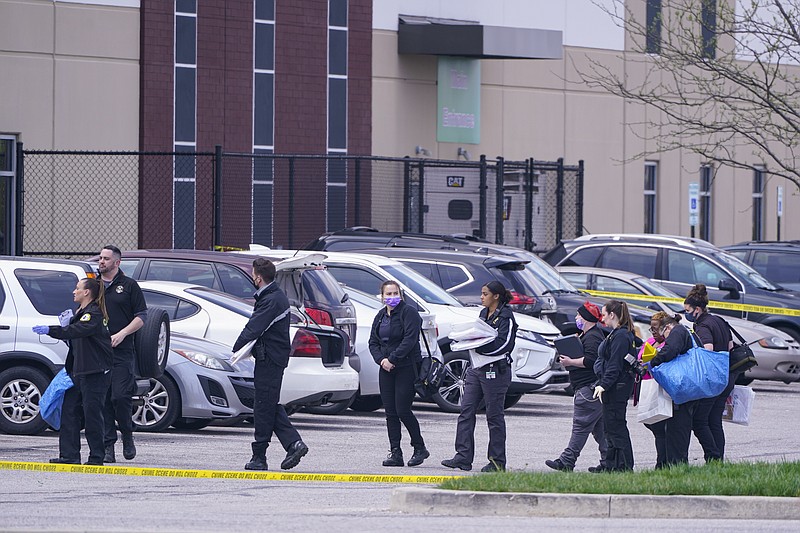WASHINGTON (AP) - As the nation struggles with another mass shooting and faces a reckoning over the deaths of Black men at the hands of police, President Joe Biden is calling for action. Going beyond that, however, is proving a lot more difficult.
Three months into his presidency, Biden's agenda is running up against the realities of his narrow Democratic majority on Capitol Hill and the Senate's limited ability to tackle multiple pieces of large-scale legislation at once. With the White House focusing first on a sweeping coronavirus relief package and now a sprawling infrastructure plan that is likely to dominate the congressional calendar for months, issues like gun control and police reform appear likely to take a back seat.
Biden insisted Friday that wasn't the case, saying on the issue of gun control in particular, "I've never not prioritized this." He spoke a day after a gunman killed eight people at a FedEx facility in Indianapolis, the latest in a rash of mass shootings across the United States in recent weeks.
At issue for Biden are many of the central promises he made to Democratic voters - particularly Black voters who helped propel him to the White House - both about his priorities and his ability to maneuver in Washington, where issues like gun control have languished for years. The mass shootings, as well as renewed focus on police killings of Americans of color following incidents in Chicago and a Minneapolis suburb, have increased demands for action.
DeAnna Hoskins, president and CEO of Just LeadershipUSA, a police reform advocacy group, suggested activists are willing to be patient but not for long. She welcomed Biden's recent executive orders on gun control, which took modest steps toward tightening background checks, but said "those actions don't go far enough."
"They don't have the tentacles down in to really hit where rubber hits the road," Hoskins said.
The White House said it can multitask, pushing publicly on its infrastructure plan while working to build support among moderate Democrats and Republicans on gun control and policing reform behind the scenes.
"In this building, the legislative team, senior members of the White House staff, we are working on multiple fronts at the same time," White House press secretary Jen Psaki said.
Officials said Biden's less publicly prominent role in legislative discussions on guns and policing is by design, out of risk of further politicizing already complicated negotiations. They also assert issuing executive orders on policing could undermine any momentum on the issue on Capitol Hill, and they're buoyed by burgeoning discussions in Congress, such as talks between Republican Sen. Tim Scott and Democratic Sen. Cory Booker.
Still, Biden has described his legislative strategy as a "one at a time" approach. He said last month that successful presidents make progress because "they know how to time what they're doing, order it, decide and prioritize what needs to be done."
Implicit in that statement was some priorities would have to wait their turn.
Biden has taken some executive actions on guns, targeting homemade "ghost guns" and the stabilizing braces for handguns that allow them to be fired from a shoulder, like a rifle. He has not proposed new legislation to revoke gun manufacturers' liability protections or to toughen federal background checks, despite pledging to send such legislation to Congress on his first day in office. Instead, he's supporting legislation proposed by House Democrats.
On police reform, on Friday, Attorney General Merrick Garland did rescind Trump-era limits on consent decrees, the court-ordered agreements used to enforce reforms within police departments. But Biden has yet to take any significant executive action, largely focusing instead on the George Floyd Justice in Policing Act on Capitol Hill.
That focus has been embraced by some major police reform groups, including the Leadership Conference on Civil and Human Rights, whose interim president and CEO, Wade Henderson, said legislation was the best approach to such an intractable problem.
"This matter is much too urgent for delay, and Congress is by far the more appropriate venue to consider changes in law regarding police accountability," he said in a statement.
But that bill, approved by the House, is sitting in the Senate - and that's where the the vote counting gets tricky for the Biden White House.
Legislation on guns and policing cannot be considered in Congress via the budget reconciliation process, the route that Democrats took to pass virus relief with just their party's 50 votes in the Senate. That's the same way they appear on track to tackle infrastructure. That means Democrats would need 10 Republicans to join them to pass the firearms or police legislation under current Senate procedures.

